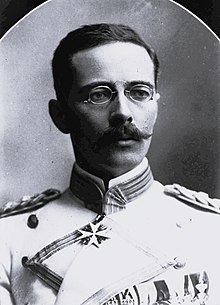Gustav Adolf von Götzen
Gustav Adolf von Götzen | |
|---|---|
 | |
| 6th Reichskommissar of German East Africa | |
| In office 12 March 1901 – 15 April 1906 | |
| Deputy | Friedrich Wilhelm von Lindeiner-Wildau |
| Preceded by | Eduard von Liebert |
| Succeeded by | Albrecht von Rechenberg |
| Personal details | |
| Born | 12 May 1866 Scharfeneck Castle, Kingdom of Prussia, German Confederation |
| Died | 1 December 1910 (aged 44) Berlin, Province of Brandenburg, German Empire |
| Military service | |
| Allegiance | |
| Branch/service | |
| Years of service | 1887–1908 |
| Rank | Spanish-American War (observer) Maji Maji Rebellion |
Gustav Adolf Graf von Götzen (12 May 1866 – 1 December 1910) was a German explorer, colonial administrator, and military officer who served as Reichskommissar of German East Africa. He came to Rwanda in 1894 becoming the second European to enter the territory, since Oscar Baumann’s brief expedition in 1892, and later, he became the first European to cross the entire territory of Rwanda.
During the Maji Maji Rebellion of 1905, Götzen commanded the Schutztruppe against several rebelling African tribes in the German East Africa colony, successfully quelling the uprising. The rebellion and famine that followed resulted in the deaths of up to 300,000 people.
Early life and education
Count von Götzen was born into a comital family at their main residence,
Von Götzen studied
In 1892, having been made an officer in the War academy, Götzen travelled to the Ottoman Empire with Major Walther von Diest.
Military career
1892 - 1896: Expeditions to Africa
From 1885, Carl Peters had begun claiming areas of East Africa for Germany. The Tanganyikan coast proved relatively easy, but conquest of the inland areas of the colony - right up to the Belgian Congo - was more difficult as large parts were still unexplored. For this reason, Götzen led an expedition to claim these hinterlands. He took with him Georg von Prittwitz and Hermann Kersting.
The group set off from
, the western edge of the kingdom.After encountering and climbing some of the
Service in America: 1896 - 1901
Between 1896 and 1898 Götzen worked as an
German East Africa and Maji Maji Rebellion: 1901-1906
Due to his knowledge of local conditions, Götzen was appointed governor of German East Africa in March 1901. There had already been rebellions by the native population in the 1880s and 1890s, and in 1905 Götzen was faced with outbreak of the
On the 14th of June 1906, Götzen later returned to Germany after submitting a report to the Foreign Office outlining what he believed were the causes of the Maji Maji Rebellion. The Foreign Office, keen to avoid a colonial scandal, accepted Götzen's report, and he retired ostensibly on the grounds of ill health.[4] Following his retirement, the German government began to administer its overseas possessions under civilian control.
Later life
Götzen's diplomatic career was almost at an end after his work as Governor. In early 1907 he was offered the minor post of a German envoy to Hamburg in which his duties would involve mostly accompanying the Kaiser through the city. This lighter amount of work gave Götzen the opportunity to publish a book DEUTSCH-OSTAFRIKA IM AUFSTAND, 1905-1906. In it, he attempted to justify his involvement in the Maji Maji Rebellion and the causes that prompted his response to quell the rebellion. This work was later published in 1909. Götzen still took an interest in the colonial politics of the German Empire; he was an active member of the committee for the German Colonial Society until his death on December 1, 1910 in a hospital in Schöneberg near Berlin.[5] His wife outlived him by over two decades. They were buried together at the Ohlsdorfer Cemetery in Hamburg.[6]
Legacy
The German passenger ship Graf von Götzen was named after Götzen and used as part of Germany's war effort on
Writings by Götzen
- Gustav Adolf von Götzen (1895). Durch Afrika von Ost nach West. D. Reimer. p. 1.
Gustav Adolf von Götzen.
. Berlin (1895) - Deutsch-Ostafrika im Aufstand 1905/06. Berlin (1909). English translation: German East Africa in Rebellion, 1905/06 (2019).
Further reading
- Reinhart Bindseil: Ruanda im Lebensbild des Offiziers, Afrikaforschers und Kaiserlichen Gouverneurs Gustav Adolf Graf von Götzen (1866–1910). Mit einem Abriss über die zeitgenössischen Forschungsreisenden Franz Stuhlmann, Oscar Baumann, Richard Kandt, Adolf Friedrich Herzog zu Mecklenburg und Hans Meyer. Berlin 1992. ISBN 3-496-00427-4
References
- ^ "Graf Gustav ADOLF von Götzen".
- ^ German East Africa in Rebellion, 1905/06 (Deutsch-Ostafrika im Aufstand, 1905/06): The History of the Maji Maji Rebellion in Tanzania, written by the German Colonial Governor, Count Gustav Adolf von Götzen; translated into English 2019 by John East
- ISBN 3-7637-5969-7.
- ^ East, J. (2019). German East Africa In Rebellion, 1905/06. Online.
- ^ Sterbeurkunde: StA Berlin-Schöneberg I Nr.1724
- ^ (East, 2019)
- ^ Article in the BBC
External links
- . New International Encyclopedia. 1905.
- Newspaper clippings about Gustav Adolf von Götzen in the 20th Century Press Archives of the ZBW

